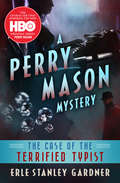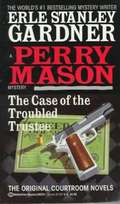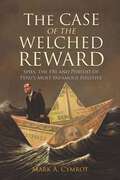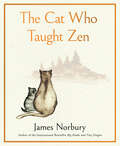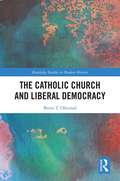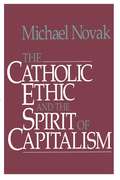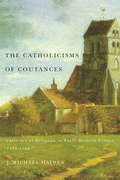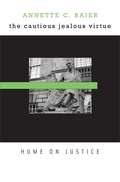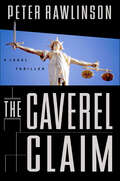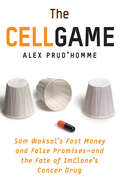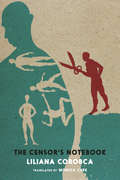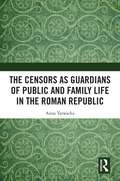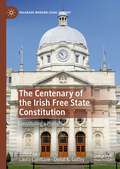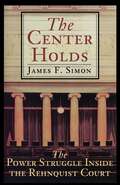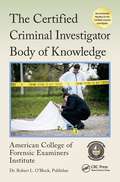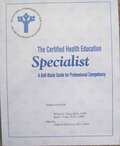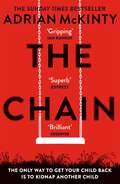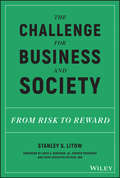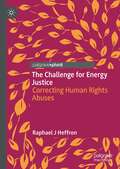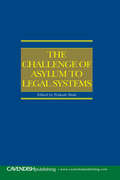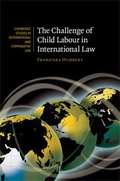- Table View
- List View
The Case of the Terrified Typist (The Perry Mason Mysteries #5)
by Erle Stanley GardnerThe Edgar Award–winning author&’s tale of a missing woman and a crime ring, featuring the lawyer and detective who inspired the HBO limited series. Defense lawyer Perry Mason needs a temporary typist, but the one he hires turns out to be more temporary than expected. When she disappears, leaving a couple of diamonds behind in her haste, Mason winds up taking on a new client: a gem importer in his office building who&’s been charged with smuggling and murder. But if Mason&’s going to untangle this case, finding the typist is key . . . This mystery is part of Edgar Award–winning author Erle Stanley Gardner&’s classic, long-running Perry Mason series, which has sold three hundred million copies and serves as the inspiration for the HBO show starring Matthew Rhys and Tatiana Maslany. &“Millions of Americans never seem to tire of Gardner&’s thrillers.&” —The New York Times DON&’T MISS THE NEW HBO ORIGINAL SERIES PERRY MASON, BASED ON CHARACTERS FROM ERLE STANLEY GARDNER&’S NOVELS, STARRING EMMY AWARD WINNER MATTHEW RHYS
The Case of the Troubled Trustee
by Erle Stanley GardnerPerry Mason acquires an interesting client, who was made trustee for the girl he loved and embezzled her funds for her own protection.
The Case of the Vagabond Virgin
by Erle Stanley GardnerProminent businessman John Addison persuades Perry Mason to spring Veronica Dale, a sweet young thing, from the local jail where she was locked up overnight for vagrancy. Once her release is arranged, however, Mason discovers that this innocent-looking girl, who is new in town, is part of an elaborate blackmail plot and wanted for murder.
The Case of the Velvet Claws
by Erle Stanley GardnerThanks to a bungled robbery at a fancy hotel, the already-married Eva Griffin has been caught in the company of a prominent congressman. To protect the politico, Eva's ready to pay the editor of a sleazy tabloid his hush money. But Perry Mason has other plans. He tracks down the phantom fat cat who secretly runs the blackmailing tabloid -- only to discover a shocking scoop. By the time Mason's comely client finally comes clean, her husband has taken a bullet in the heart. Now Perry Mason has two choices: represent the cunning widow in her wrangle for the dead man's money -- or take the rap for murder.
The Case of the Waylaid Wolf
by Erle Stanley GardnerA woman defends herself from date rape by stealing his car. When her would-be rapist is found dead, Perry Mason defends her on the murder charge and does some spectacular misdirection with the evidence.
The Case of the Welched Reward: Spies, the FBI and Pursuit of Peru's Most Infamous Fugitive
by Mark A. CymrotReward takes the reader behind the scenes of an international manhunt and an unusual lawsuit that rattled law enforcement in three countries. The story is born out of a real-life spy thriller--the flight of Peru's notorious National Security chief,
The Case of the Worried Waitress
by Erle Stanley GardnerA pretty waitress is accused of stealing $100 from her wealthy aunt's hatbox and a blind pencil-seller earns enough to come to work in a taxicab. It is a mystery for Perry Mason and it will take some quick thinking and careful planning on his part to find the culprits.
The Cat Who Taught Zen EBP
by James NorburyFrom the author and illustrator of the international bestseller Big Panda and Tiny Dragon comes a beautifully illustrated exploration into the journeys we take for self-discovery and the connections we make along the way.In a distant city, an old cat considers himself as wise as can be, until he hears of an ancient pine far away, under the boughs of which infinite wisdom can be found. Thus, the Cat embarks on a journey deep into the forest to search for the tree. Along the way, he meets new friends—the Hare, the Magpie, the Wolf Cub, the Monkey, the Tortoise, and the Tiger—and comes across the energetic young Kitten. What wisdom does the Cat have to impart to his friends, and, perhaps more importantly, what does he still have to learn?Inspired by Zen koans, with stunning illustrations and a gentle voice, The Cat Who Taught Zen has wisdom to offer all readers.
The Catholic Church and Liberal Democracy (Routledge Studies in Modern History)
by Bernt Torvild OftestadThe Roman Catholic Church's critical stance towards liberalism and democracy following the French Revolution and through the 19th century was often entrenched, but the Second Vatican Council of the 1960s saw a shift in the Church's attitude towards democracy. In recent years, a conflict has emerged between Church doctrine and modern liberalism under Popes John Paul II and Benedict XVI. This book is a comprehensive overview of the Catholic Church's relationship to modern liberal democracy, from the end of the 18th century until today. It is a connection that is situated within the context of the history of ideas itself.
The Catholic Ethic And The Spirit Of Capitalism
by Michael Novak Jana NovakThe Catholic Church has, for generations, been reluctant to come to terms with capitalism. Novak argues that a 100-year debate within the Catholic Church has yielded a richer and more humane vision of capitalism than that described in Weber's Protestant Ethic.
The Catholicisms of Coutances: Varieties of Religion in Early Modern France, 1350-1789 (McGill-Queen's Studies in the History of Religion #159)
by J. Michael HaydenThe Catholicisms of Coutances is a richly detailed account of France from the Hundred Years' War to the French revolution. Coining the word "catholicisms" to denote the complex varieties of religious beliefs and practices within the Church, J. Michael Hayden presents a detailed analysis of the diocese of Coutances - chosen because of the unusually large number of records available - to shed light on the many ways in which religion developed and affected life in early modern France. Opening with a geographical and chronological sketch of the diocese, Hayden describes the catholicisms of mid-fourteenth century Coutances, discussing their evolution and effects over four hundred years. Employing a wide array of primary sources, the book provides a meticulous study that includes qualitative analyses of papal and diocesan documents and synodal statutes, a quantitative analysis of ordination and pastoral visit records, and a combination of both forms of analysis of the cahiers prepared for the Estates General of 1789. The Catholicisms of Coutances is an innovative contribution to contemporary understandings of Catholic beliefs and practices in the early modern period and their profound effect on the people of a diocese.
The Cautious Jealous Virtue: Hume On Justice
by Annette BaierLike David Hume, whose work on justice she engages here, Annette C. Baier is a consummate essayist: her spirited, witty prose captures nuances and telling examples in order to elucidate important philosophical ideas. <p><p> Baier is also one of Hume's most sensitive and insightful readers. In The Cautious Jealous Virtue, she deepens our understanding of Hume by examining what he meant by “justice.” In Baier's account, Hume always understood justice to be closely linked to self-interest (hence his description of it in An Enquiry Concerning the Principles of Morals as “the cautious jealous virtue”), but his understanding of the virtue expanded over time, as evidenced by later works, including his History of England. <p> Along with justice, Baier investigates the role of the natural virtue of equity (which Hume always understood to constrain justice) in Hume's thought, arguing that Hume's view of equity can serve to balance his account of the artificial virtue of justice. The Cautious Jealous Virtue is an illuminating meditation that will interest not only Hume scholars but also those interested in the issues of justice and in ethics more generally.
The Caverel Claim: A Legal Thriller
by Peter RawlinsonAs this brilliant tale unfolds, a fight-to-the-death to preserve a wealthy English family's prestige begins. Untold secrets suddenly threaten the stability of one mother's existence and change life as she and her son know it. Will the court decide in favor of the unusual young woman raised in South Carolina-or will she be found to be a fraud and thus unworthy of the life she claims is rightfully hers? A mystery as dramatic and thrilling as the best of today's legal thrillers, The Caverel Claim by Peter Rawlinson will leave you breathless.
The Cell Game: Sam Waksal's Fast Money and False Promises—and the Fate of ImClone's Cancer Drug
by Alex Prud'hommeThe “chilling tale” of ImClone Systems, its promising cancer drug, Erbitux, and the insider trading scandal that ensnared Martha Stewart (U.S. News & World Report).The Cell Game is the quintessential business saga of the late 1990s. It's the story of big money and cutting-edge science, celebrity, greed, and slipshod business practices; the story of biotech hype and hope and every kind of excess.At the center of it all stands a single, enigmatic figure named Sam Waksal. A brilliant, mercurial, and desperate-to-be-liked entrepreneur, Waksal was addicted to the trappings of wealth and fame that accrued to a darling of the stock market and the overheated atmosphere of biotech IPOs. At the height of his stardom, Waksal hobnobbed with Martha Stewart in New York and Carl Icahn in the Hamptons, hosted parties at his fabulous art-filled loft, and was a fixture in the gossip columns. He promised that Erbitux would "change oncology," and would soon be making $1 billion a year.But as Waksal partied late into the night, desperate cancer patients languished, waiting for his drug to come to market. When the FDA withheld approval of Erbitux, the charming scientist who had always stayed just one step ahead of bankruptcy panicked and desperately tried to cash in his stock before the bad news hit Wall Street.Waksal served time in prison, the first of the Enron-era white-collar criminals to be sentenced. Yet his cancer drug has proved more durable than his evanescent profits.“A fast-paced, absorbing, and dramatic account . . . An important, excellent book that makes for fascinating reading.” —Library Journal
The Censor's Notebook: A Novel
by Liliana CorobcaA fascinating narrative of life in communist Romania, and a thought-provoking meditation on the nature of literature and censorship.A Censor&’s Notebook is a window into the intimate workings of censorship under communism, steeped in mystery and secrets and lies, confirming the power of literature to capture personal and political truths. The novel begins with a seemingly non-fiction frame story—an exchange of letters between the author and Emilia Codrescu, the female chief of the Secret Documents Office in Romania&’s feared State Directorate of Media and Printing, the government branch responsible for censorship. Codrescu had been responsible for the burning and shredding of the censors&’ notebooks and the state secrets in them, but prior to fleeing the country in 1974 she had stolen one of these notebooks. Now, forty years later, she makes the notebook available to Liliana, the character of the author, for the newly instituted Museum of Communism. The work of a censor—a job about which it is forbidden to talk—is revealed in this notebook, which discloses the structures of this mysterious institution and describes how these professional readers and ideological error hunters are burdened with hundreds of manuscripts, strict deadlines, and threatening penalties. The censors lose their identity, and are often frazzled by neuroses and other illnesses.
The Censors as Guardians of Public and Family Life in the Roman Republic
by Anna TarwackaThis volume explores the effects of the Roman censorial mark (nota censoria) and the influence of censorial regulations on the development of written law in ancient Rome.The censor was one of the most fascinating legal institutions of Republican Rome. One of the most colourful and anecdotal areas of censorial activities was in the upkeep of public morals (regimen morum) through which censors controlled private, even intimate, aspects of Roman life. Although the office of the censor has been studied by various scholars from prosopographical, historical, and social perspectives, there has been no comprehensive study of its impact on the development of written law. This book aims to full the gap by providing an overview of the applications of the nota censoria to demonstrate its impact on the development of numerous regulations in the field of private and public laws during the Republican and Imperial periods. This book explores the relationship between magistrate law (ius honorarium) and regimen morum, and how the activities of the censors in this area influenced the formation of praetorian edicts and later legislation during the Principate period, most notably the marriage laws of Augustus. By examining the influence of the censor and the censorial nota in these spheres, readers will gain a new understanding of the overall significance of the censor's office in shaping the Roman legal order. The Censors as Guardians of Public and Family Life in the Roman Republic will be of interest to students and scholars of Roman law in both the Republican and Imperial periods, as well as to those interested in Roman moral attitudes and society more broadly.
The Centenary of the Irish Free State Constitution: Constituting a Polity? (Palgrave Modern Legal History)
by Laura Cahillane Donal K. CoffeyThis book deals with the role, development, and legacy of the first Constitution of independent Ireland within the wider context of the establishment of the State. After decades of relative neglect, the 1920s have been receiving increased attention from historians recently thanks to the centenary of the State’s foundation. This book continues this trend of re-examination of this period and looks at key themes, such as the establishment of institutions under the Irish Free State Constitution and the focus on the ideals of popular sovereignty and democracy. It does so from novel and cross-disciplinary perspectives, and it also looks at areas which have received little to no previous attention; from individual aspects like property rights, the Irish language and environmental rights to aspects such as opposition and partition.
The Center Holds: The Power Struggle Inside the Rehnquist Court
by James F. SimonThe Center Holds provides an intimate look at who the Supreme Court justices are, how they have made critical decisions, and why, ultimately, the Rehnquist Revolution failed.Focusing on four key areas of civil rights and liberties--racial discrimination, abortion, criminal law, and First Amendment freedoms--TheCenter Holds provides an in-depth look at the Supreme Court documents that illustrate the battle between the old liberal order and emerging conservative majority, beginning in the early 1980s. James F. Simon, a former Time correspondent and contributing editor, ex-dean of New York Law School, and nationally recognized scholar of constitutional law, examines key decisions on civil rights and civil liberties in a readable, intimate look at some key Supreme Court Cases and includes absorbing descriptions of confidential memos and drafts gleaned from sources from within the court.
The Certified Criminal Investigator Body of Knowledge (Center For National Threat Assessment Ser. #3)
by 0 American College of Forensic Examiners InstituteCriminal investigators have a long list of duties. They must identify and secure a crime scene, conduct interviews of witnesses and victims, interrogate suspects, identify and properly collect evidence, and establish and maintain a chain of custody. Once an investigation is underway, the criminal investigator must demonstrate thorough knowledge of
The Certified Health Education Specialist: A Self-Study Guide for Professional Competency
by Michael J ClearyThe Chain: The Award-Winning Suspense Thriller of the Year
by Adrian McKintyTHE ONLY WAY TO GET YOUR CHILD BACK IS TO KIDNAP ANOTHER CHILD'A blazing, full-tilt thriller that entirely justifies the hype' GUARDIAN'A heart-stopping roller coaster' DAILY MAIL* * * * *YOUR PHONE RINGS.A STRANGER HAS KIDNAPPED YOUR CHILD.TO FREE THEM YOU MUST ABDUCT SOMEONE ELSE'S CHILD.YOUR CHILD WILL BE RELEASED WHEN YOUR VICTIM'S PARENTS KIDNAP ANOTHER CHILD.IF ANY OF THESE THINGS DON'T HAPPEN:YOUR CHILD WILL BE KILLED.VICTIM. SURVIVOR. ABDUCTOR. CRIMINAL.YOU WILL BECOME EACH ONE. YOU ARE NOW PART OF THE CHAIN * * * * *THE MULTI-AWARD-WINNING THRILLERWinner: Theakstons Old Peculier Crime Novel of the YearWinner: Ned Kelly Award for Best International Crime Fiction Winner: International Thriller Writers Awards - Best Hardcover Winner: Macavity Awards - Best International Crime Fiction Winner: Barry Award - Thriller of the Year*****'A heart-stopping roller coaster'DAILY MAIL'The book everyone is talking about'MIRROR'Scary, plausible, gripping.'IAN RANKIN'You'll miss meals, sleep, and your stop on the bus - guaranteed.'VAL McDERMID'I writhed with the pain of withdrawal when I finished it. Deserves to be the popular hit of the year.'DAILY TELEGRAPH'Incredibly propulsive and original. You won't shake it for a long time.'STEPHEN KING'A masterpiece. You will never be able to forget it.'DON WINSLOW'A unique and unforgettable thriller. Breath-taking, breakneck, brilliant.'MARK BILLINGHAM'Striking, memorable, should be savoured.'TANA FRENCH'Explosively brilliant. Genuinely unputdownable. Terribly plausible'OBSERVER'I may not read a better thriller in my lifetime.'STEVE CAVANAGH 'An electrifying thriller - one of the very best of its kind'FIONA CUMMINS'What a fantastic idea and perfectly written. I'm quite jealous.'ANTHONY HOROWITZ'Terrifying. Terrific.'MICK HERRON'THE CHAIN does for parenting what Gone Girl did for marriage. A must-read thriller.'JAMES SWALLOW'Diabolical, unnerving, relentless.'DENNIS LEHANE'Utterly brilliant'ELLY GRIFFITHSA 'THRILLER OF THE YEAR' SELECTION FOR:GUARDIANDAILY TELEGRAPHAMAZONEXPRESSOBSERVERTIME MAGAZINE
The Challenge for Business and Society: From Risk to Reward
by Stanley S. LitowA roadmap to improve corporate social responsibility The 2016 U.S. Presidential Campaign focused a good deal of attention on the role of corporations in society, from both sides of the aisle. In the lead up to the election, big companies were accused of profiteering, plundering the environment, and ignoring (even exacerbating) societal ills ranging from illiteracy and discrimination to obesity and opioid addiction. Income inequality was laid squarely at the feet of us companies. The Trump administration then moved swiftly to scrap fiscal, social, and environmental rules that purportedly hobble business, to redirect or shut down cabinet offices historically protecting the public good, and to roll back clean power, consumer protection, living wage, healthy eating initiatives and even basic public funding for public schools. To many eyes, and the lens of history, this may usher in a new era of cowboy capitalism with big companies, unfettered by regulation and encouraged by the presidential bully pulpit, free to go about the business of making money—no matter the consequences to consumers and the commonwealth. While this may please some companies in the short term, the long term consequences might result in just the opposite. And while the new administration promises to reduce "foreign aid" and the social safety net, Stanley S. Litow believes big companies will be motivated to step up their efforts to create jobs, reduce poverty, improve education and health, and address climate change issues — both domestically and around the world. For some leaders in the private sector this is not a matter of public relations or charity. It is integral to their corporate strategy—resulting in creating new markets, reducing risks, attracting and retaining top talent, and generating growth and realizing opportunities. Through case studies (many of which the author spearheaded at IBM), The Challenge for Business and Society provides clear guidance for companies to build their own corporate sustainability and social responsibility plans positively effecting their bottom lines producing real return on their investments. This book will help: • Create an effective corporate social responsibility and sustainability plan • Provide long-term bottom line benefit • Protect and enrich brand value• Recruit and retain top talent Perfect for CEOs, CFOs, Human Resource/Corporate Affairs executives, but also for government and not-for-profit leaders, this book helps you come up with a solid plan for giving back to society, producing real sustainable value.
The Challenge for Energy Justice: Correcting Human Rights Abuses
by Raphael J HeffronWritten by one of the world’s leading scholars in the field, this book provides a unique perspective on the connections between energy justice and human rights. Taking an interdisciplinary approach, the author offers an accessible discussion about the implementation of energy justice in practice. The book explores the rise of justice issues in the energy sector, the interdisciplinary nature of energy justice, the economics of energy justice and provides a practical case study on distributive justice. The penultimate chapter focuses on human rights and energy justice in a world first, and explores the topic from the perspective of the opportunity of last resort. This ‘opportunity of last resort’ is the national courts and is the place where societies can seek to have justice enforced through a variety of human rights being protected. Finally, energy justice risks are highlighted alongside the author’s proposed framework for the next generation of energy justice scholars.
The Challenge of Asylum to Legal Systems
by Prakash ShahA collection of papers presenting critical perspectives in the development of asylum law with a focus on European and UK developments, incorporating international human rights law and comparative law perspectives. Issues covered range from law-making at the EU level, with a particular focus on extra-territorial processing of refugees claims, asylum procedures, family members of those in need of protection, welfare benefits and impact of national level on the reception of EU norms. Domestic and comparative perspectives offered include discussions on detention, judicial decision-making, appeal rights, claims processing with particular reference to the role of interpreters and developments in Australia which have provided a model of thought worthy of emulation in the UK.
The Challenge of Child Labour in International Law
by Franziska HumbertChild labour remains a widespread problem around the world. Over 200 million children can be regarded as child labourers, and about 10 million children are involved in producing either agricultural or manufactured products for export. Franziska Humbert explores the status of child labour in international law. Offering a wide-ranging analysis of the problem, she explores the various UN and ILO instruments and reveals the weaknesses of the current frameworks installed by these bodies to protect children from economic exploitation. After assessing to what extent trade measures such as conditionalities, labelling and trade restrictions and promotional activities can reduce child labour, she suggests an alternative legal framework which takes into account the needs of children.
